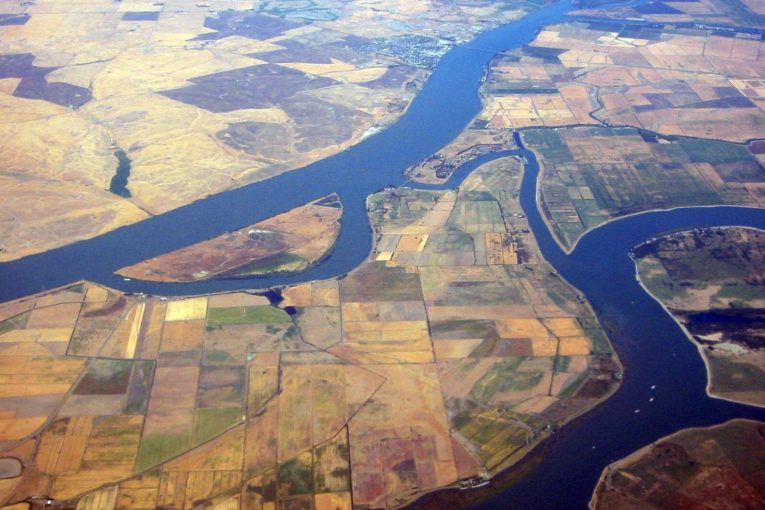
![]()

worldislandinfo.com, CC BY 2.0 <https://creativecommons.org/licenses/by/2.0>, via Wikimedia Commons
By Sheila Teker
As environmental crises have arisen from excessive diversions of water from rivers and streams, numerous groups and organizations have become more outspoken about the racist foundations of who has the rights to the use of surface water. Although rights to water, especially in California, seem like they should be granted in a straightforward, organized manner, it is instead notorious for being exceptionally convoluted.
The 4 most common types of rights in California’s complicated system are riparian, pre-1914 and post-1914 appropriative, and prescriptive rights. Of these 4, the most problematic — and most prevalent — is the pre-1914 right, which operated on the “first in time, first in right” rule. To obtain this right, white settlers at the time could simply stake their “intent for ownership” by nailing a notice to a tree. These constitute today’s senior rights holders, who have historically “dodged years of [water] delivery cuts triggered by ecological collapse of California’s water hub, the sprawling delta of the Sacramento and San Joaquin rivers” (learn more about California’s water rights laws here).
As cuts to water supply are recently being made due to “continuing drought”, the individuals described above are still provided with at least 40% of their original supply, especially because “people who have held water rights the longest [are] impacted the least,” AP News reported. In addition to this, the recently launched Water Futures Market allows such individuals to “gamble” and make a profit off the water they hold. “Rights holders of real-life water may hoard their water in response,” reported Food&Water Watch. (read more about the Water Futures market here).
Thus, while some continue to have access to divert excesses of water for agricultural or other uses, there is simultaneously “a severe drought…threatening the drinking water supply for 25 million people.” In the San Joaquin Valley, there are still “colonias—unincorporated communities that are home to some of the Valley’s poorest residents” — which, being “the products of a long history of racism and housing discrimination,” have historically and presently battled for clean water.
Coupled with this is a concern for what implications this has for the Sacramento-San Joaquin Delta, which, according to UC Davis Professor and member of the Delta Science Commission Julie Sze, “What happens to it, and what happens to it under climate change is a huge issue”, and yet “barely anyone knows that it exists, because it does not get a lot of attention…despite supplying ⅔ of the water the state of California uses.”
In other words, while endangering the water supply of entire communities, the division of water supply to many individuals — and some of whom take more water than they should — has had devastating ecological consequences. “The Sacramento-San Joaquin Delta, heart of California’s water delivery system and the West Coast’s largest estuary, is crashing…the state must …ensure enough freshwater is flowing through the Delta to sustain fish, wildlife and communities,” reported Cal Matters. In summer 2022, “one agricultural irrigation district defied drought regulations and drained water from the Shasta River, violating flow requirements intended to protect salmon,” said LA Times. By decreasing the size of the habitat of fragile, at-risk fish species, not only do abuses of water rights threaten essential food production, but they wreak havoc on the now barely-existent aquatic ecosystem.
$4,000, the “maximum amount for the violation”, was the overall fine, which “‘was clearly not a deterrent’”, said Yvonne West, director of the State Water Board’s office of enforcement. And because of this, such offenses continue to take place.
Restore the Delta, a “grassroots campaign of residents, [tribes], and organizations committed to restoring the Sacramento-San Joaquin Delta” released in February 2023 “the results of a California water rights analysis by race, completed by employees within the Department of Water Resources, but deleted from the agency’s website soon after posting.” The study demonstrated that “among some 14,000 water right holders…91 percent were white.”
“You can’t separate water from California—that is the history, and it dictates how current policies are set up…because California still recognizes rights from the past…despite it being hugely antidemocratic ,” said Sze.
In a “Petition for Rulemaking to Review and Revise Bay-Delta Water Quality Standards”, written by several tribes in collaboration with Restore the Delta to the California State Water Resources Control Board, “State-sponsored dispossession and oppression went hand in hand with the development of the modern California water rights regime, which accorded legal water rights to white settlers claiming to put the water to its first beneficial use while divesting Indigenous People from prior rights to the water and excluding communities of color from access to water rights.”
With an archaic water rights system that remains in place even today — where statements like the aforementioned petitions are created by groups demanding their voices be heard — the individuals historically prevented from obtaining access to water continue to be barred from contributing their ideas to policy-making.
But groups such as the Delta Stewardship Council, alongside other activists who are calling for policy reforms in regards to water rights, are making an effort to inform people and agencies about the history of California’s water rights system, and how it affects decision-making today, according to Sze.
“It’s a lot of learning…[knowledge about California’s water] has been a certain way for 170 years…and you can’t really change things that quickly,” said Sze. “But the delta stewardship council has been very powerful and is really trying to make this understandable and approachable to everyone.”
Sheila Teker is a writer for the Vanguard at Berkeley’s Social Justice Desk.